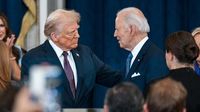In a significant and controversial move on March 21, 2025, US President Donald Trump revoked the security clearances of several prominent figures, including his predecessor, Joe Biden, former Vice President Kamala Harris, and a host of other senior officials. This sweeping directive has reignited tensions from past political rivalries, serving as a stark reminder of the partisan hostilities that have increasingly polarized the nation.
Trump's memorandum, directed at every executive department and agency head, stipulated, "I hereby direct every executive department and agency head … to revoke any active security clearances held by the aforementioned individuals.” This included not only Biden and Harris but also several key players from the previous administration, such as former Secretary of State Antony Blinken and national security adviser Jake Sullivan. Notably, former candidate Hillary Clinton was likewise affected by this order.
The revocation of security clearances for these individuals—who traditionally retain them as a courtesy—has raised eyebrows and sparked debates on the motivations behind such actions. Following closely behind this controversy is the background of Trump's long-standing feud with Biden, which has seen the former president frequently alleging that the 2020 election was marred by fraud, a claim widely debunked yet ardently maintained by Trump.
Interestingly, this action isn't without its historical precedence. In 2021, during Biden's administration, he issued an order revoking Trump’s own security clearance after he left office. The irony is palpable, as Trump’s actions now reflect a retaliatory pattern against those he perceives as adversaries, marking a continuous cycle of political tit-for-tat.
Moreover, the broader implications of this decision extend beyond simple access to classified information. It signals a clear intention from Trump to further entrench divisions within government ranks, as the individuals targeted often served or advised during his presidency, representing a cross-section of both Democratic and Republican administrations. Notables also include former Republican congresswoman Liz Cheney and Fiona Hill, a respected intelligence analyst who has worked across party lines.
As the fallout from this decision unfolds, individuals such as Alexander Vindman, a decorated Army officer who became famous for testifying against Trump during the impeachment proceedings, have also found themselves on this expansive list. The targeting of Vindman exemplifies the lengths to which Trump might go to consolidate authority and challenge dissent within the intelligence community.
Trump's confrontation with political norms regarding security clearances is indeed unprecedented. The former president claimed, "I also direct all executive department and agency heads to revoke unescorted access to secure United States Government facilities from these individuals.” The termination of such access further complicates matters, not only affecting their abilities to engage with government findings but also stifling potential avenues for informed public discourse and understanding.
The security clearance controversy taps into bigger issues within the United States political ecosystem, specifically the ongoing struggle for control and collaboration between competing factions. The decision underscores an adverse trajectory wherein retaliation overshadows cooperation, with security clearances becoming a pawn in the political gamesmanship between Trump and his adversaries.
This ongoing saga showcases how personal vendettas can impact governmental functioning. With Trump’s actions following his return to the presidency, many analysts are closely monitoring how this might affect the working environment within federal agencies. The revocation has prompted concern among various political analysts and security experts, with calls for dialogue regarding the ethical considerations of using security protocols as a weapon against former officials.
As with many aspects of Trump’s administration, this latest action has polarized public opinion. Some view it as a necessary action to protect national security, while others consider it merely retaliatory—serving as political punishment against individuals who have disagreed with or criticized his leadership. The former president’s actions continue to generate harsh criticisms from segments of society traditionally critical of his governance style, particularly from those aligned with the Democratic Party and some moderate Republican voices.
The consequences of this may stretch far beyond the current political climate. The impact on relationships between former and current officials, trust within government institutions, and national security posture cannot be underestimated. Federal officials and individuals who rely on these security clearances may find themselves scrutinized more closely in the wake of these developments.
So, as Donald Trump embarks on another contentious term in office, the ultimate question remains whether this move is setting a precedent that will be further exploited in the chapter of American politics. Will the revocation of security clearances become a lasting tool in the ongoing battle between political factions, or can bipartisan efforts emerge from this deeply divided landscape? The challenge ahead is daunting, with the stakes continuing to rise amid such stark discord.


